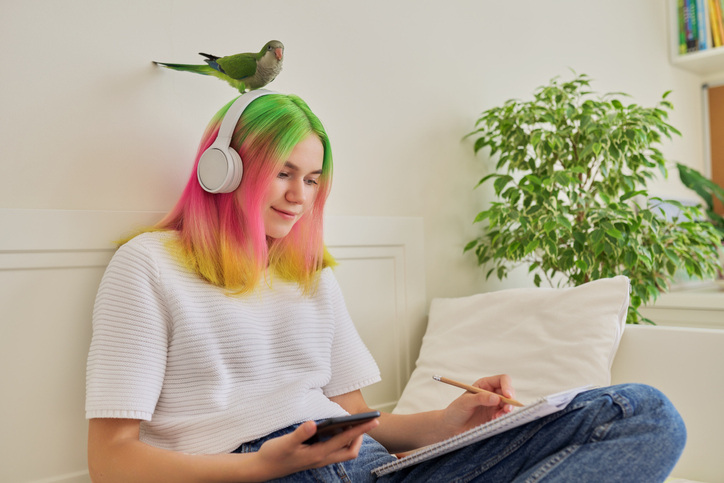6 Tips for Parenting College Students with ADHD During Summer Break
 As another school year is winding down, you may be preparing for your college student with ADHD to come back home for a while. Whether they’re home for just the summer, or moving back in, everyone in the household will need to make adjustments. Previously established family routines may require some tweaks or even a full overhaul. Your teen may be living under your roof again, but you will all benefit if you treat them more like the emerging adult they are, not the child they were. The line between where parental authority ends and their growing autonomy begins has shifted, and your household is figuring out how to live together once again. It’s exciting and somewhat uncomfortable, like breaking in a new pair of shoes: fun, but with a blister or two in the beginning. Here are six helpful tips for how to reset and maintain a satisfying and manageable family life with your young adult this summer.
As another school year is winding down, you may be preparing for your college student with ADHD to come back home for a while. Whether they’re home for just the summer, or moving back in, everyone in the household will need to make adjustments. Previously established family routines may require some tweaks or even a full overhaul. Your teen may be living under your roof again, but you will all benefit if you treat them more like the emerging adult they are, not the child they were. The line between where parental authority ends and their growing autonomy begins has shifted, and your household is figuring out how to live together once again. It’s exciting and somewhat uncomfortable, like breaking in a new pair of shoes: fun, but with a blister or two in the beginning. Here are six helpful tips for how to reset and maintain a satisfying and manageable family life with your young adult this summer.
Welcome home! Helping your ADHD child transition back home from college
Consider what your college-age child is feeling when they return home after being away for a while. They have gotten used to a certain level of independence and self-management in college. They don’t want to come home and feel “bossed around” by their parents. Your young adult college student with ADHD may also be focused on any number of new experiences–romantic relationships, shifting friendships, summer jobs or planning for the future. They may also be exhausted, needing to have some time to chill out and unwind. The last thing they want to hear is your well-intentioned advice perceived as a lecture, criticism or unsolicited assistance.  On the flip side, we, as parents, still see our college-age kids as needing our attention, guidance and motivation. We want our children to have a productive summer and pitch in around the house. And, with more of us working from home these days, it’s all too easy to get annoyed seeing our teen hanging around the house all day, staying out late or making choices with which we don’t agree. As you both may experience heightened stress from these changes, it’s natural to feel disappointed, confused, angry, or worried. You’re living under the same roof, only with new stresses and growing pains. So how should you re-engage with your teen with a healthy dose of parental authority, while still respecting their developing independence?
On the flip side, we, as parents, still see our college-age kids as needing our attention, guidance and motivation. We want our children to have a productive summer and pitch in around the house. And, with more of us working from home these days, it’s all too easy to get annoyed seeing our teen hanging around the house all day, staying out late or making choices with which we don’t agree. As you both may experience heightened stress from these changes, it’s natural to feel disappointed, confused, angry, or worried. You’re living under the same roof, only with new stresses and growing pains. So how should you re-engage with your teen with a healthy dose of parental authority, while still respecting their developing independence?
Creating healthy daily routines with your family this summer
A healthy daily summer routine will ground all of you and help to manage your time more efficiently. Use this opportunity to brainstorm ways to create structure while establishing and following through on healthy family boundaries. Of course, your child might want to sleep in and have some down time. But they need to understand that participating in the daily maintenance of the home, and taking care of responsibilities like dishes and laundry, is part of the summer plan. Instead of expecting regular dinners together, aim to agree on a few nights when you will share a supper. This allows time for their work and social commitments in the evenings. Instead of resorting to old communications and frustrating family dynamics, opt for discussions that foster collaboration and respect.
Encouraging your young adult with ADHD to practice more independence
 Our independent, young adults want to be treated more as equals, even if they may not act that way. Think about ways that they can demonstrate their developing ‘adulting’ skills, and try to listen more than talk. Reflect what you hear back to them, and state your opinions neutrally. Respond with “I notice…” or “I’ve observed…” statements. Avoid saying things like “I feel that you…” and, instead, say “I feel (an emotion) when this (action or behavior occurs).” Then, pause for their response. Give them a chance to process what you are saying and mull it over. Many emerging adults with ADHD may agree with what you are saying but want to assert some power by transforming this into their own idea or just taking time to consider it. Everybody has surely grown and changed since the last time you were all under the same roof. You want to explore ways to help them figure out a daily summer routine that accomplishes the things they need to do and the things they want to do. You’re not telling them what to do: you’re offering your assistance and coaching. If they don’t follow that, it’s fine to express your frustration. However, don’t tell them why they should. That’s not part of the collaborative spirit.
Our independent, young adults want to be treated more as equals, even if they may not act that way. Think about ways that they can demonstrate their developing ‘adulting’ skills, and try to listen more than talk. Reflect what you hear back to them, and state your opinions neutrally. Respond with “I notice…” or “I’ve observed…” statements. Avoid saying things like “I feel that you…” and, instead, say “I feel (an emotion) when this (action or behavior occurs).” Then, pause for their response. Give them a chance to process what you are saying and mull it over. Many emerging adults with ADHD may agree with what you are saying but want to assert some power by transforming this into their own idea or just taking time to consider it. Everybody has surely grown and changed since the last time you were all under the same roof. You want to explore ways to help them figure out a daily summer routine that accomplishes the things they need to do and the things they want to do. You’re not telling them what to do: you’re offering your assistance and coaching. If they don’t follow that, it’s fine to express your frustration. However, don’t tell them why they should. That’s not part of the collaborative spirit.
6 tips for parents of college students with ADHD who are returning home for summer break:
1. Start with the basics
Most emerging adults still need some support with organization, prioritizing and initiating (especially undesirable tasks). Offer to help them by working together on making a list for everything they HAVE to do (self-care, work/classes, household chores, etc.) and another of everything they WANT to do (hanging out with friends, playing music or sports or gaming). If your teen doesn’t have a summer job or internship yet, you can further divide the day into a morning ‘looking for work’ period and an afternoon one with a timed break for something fun following each one. If your child already has a job or internship, that will provide some structure to their day. However, they may need some assistance juggling family or social responsibilities to go with it.
2. Avoid micromanaging
Instead of reminding them to do stuff which they will inevitably hear as ‘nagging,’ talk with them about what types of cueing work best for them. Your goal is to offer assistance and not manage things for them. The pull for parents of older teens to do things to help (or take over for) their kids as they used to do when kids were smaller is strong. It’s equally strong for kids to resort back to their younger selves and expect you to make appointments for them or pick up after them. If they are struggling to follow through, have a discussion about what types of tools assisted them previously and how those can be applied now. In addition, it is reasonable to ask them to notify you at a certain hour if they will be out late or not planning to come home without knowing what their activities are. Living under the same roof means that you will tend to worry about them more than when they aren’t in sight. Couch this as considerate behavior rather than a control issue.
3. Re-establish responsibilities
Don’t assume your child will pick up old chores just because they’re home from college. Set up a family meeting to discuss household tasks. This way, dishes won’t mount while you’re on conference calls. Wet towels won’t spend the day collecting mold in the bathroom, either. Talk about responsibilities and the common good for your family unit. As a young adult, your child can plan and cook meals. They can give their younger sibling a ride or take the dog for a walk. They may prefer to be responsible for the recycling and the litter box rather than unloading the dishwasher. That’s okay. Try it their way, and see what happens. Kids with ADHD are also more likely to follow through on chores that mean something to them. If your kid cares about climate change, they might be more motivated to empty the compost and clean the container than grocery shopping. Make a clear agreement about who does what, write it down, post it in the kitchen, and then step back. They can set phone alarms, create to-do lists or ask a smart home device for reminders. Set up a family Google Calendar, or dust off the white board in the kitchen and get organized the old-school way.
4. Promote good sleep patterns
College-age adults are going to make a schedule that they feel works best for them. They may sleep until 10 every morning and work until 7 every night. Whereas, you may get up at 6:30 a.m. and work until 4 p.m. They’ve been in control of their own time at college, and you need to trust their process. It’s helpful to know their general daily plan. However, you don’t want to be the person knocking on their door every morning to wake them up. If your kid stays up late gaming, and then can’t get up the next day to apply for jobs or show up for one, then discuss your concerns. Explore options with them, such as turning off the internet at a certain time at night to help them get to bed sooner.
5. Be available, and empathize
Though you’re juggling more than before with your child back home from college, take advantage of openings to talk. Avoid using meal time to discuss studies or life plans. Instead, create regular check in times for those issues. Make it easy and comfortable for your college student with ADHD to come to you for advice. They might seek advice for school, work, relationships or anything else. Young adults with ADHD often want to think aloud about their decisions, process their emotional challenges or analyze social issues. Focus on listening. And, if you want to ask questions, rely on ‘what’ and ‘how’ more than ‘why.’
6. Encourage daily exercise
Like you, your kid will be healthiest and happiest if they’re exercising in some regular capacity. This could be going for a run with the dog, doing a workout video online, yoga, etc. If they aren’t doing this on their own, invite them to join you! Go for a bike ride together, or do a Pilates video on YouTube. This can be a fun and unexpected way to hang out, laugh and bond. Setting up clear expectations and structures will help make summertime relaxing and joyful for your and your emerging adult. Model how to be responsible and healthy by balancing your own work and downtime. Make plans for some fun excursions based on their interests as well as your own. Lay the groundwork for a pleasant summer now and enjoy this precious time. 
Read more blog posts:
- Consistent Parenting in ADHD Families: A 5-step plan for improving cooperation and communication
- Therapy for ADHD: 5 Tips for Finding the Right Therapist for a Child, Teen or Adult with ADHD
- The 4 Steps to New Habits with ADHD: Taking control of your routines to better meet your goals
Handouts, Webinars & More in Dr. Saline’s Store:
“Navigating College with ADHD: Setting yourself up for success” LIVE ADHD Webinar + Q&A with Dr. Sharon Saline on Zoom June 20, 2022 | 7:30-9:00pm EDT Learn more & register here!
Watch on Dr. Saline’s YouTube Channel:
- Daily Routine Tips for ADHD Adults: How to create + keep healthy habits
- Stop the Self-Sabotage: How to support yourself with love
- How to Forgive Your Kids for ADHD Symptoms Beyond Their Control

